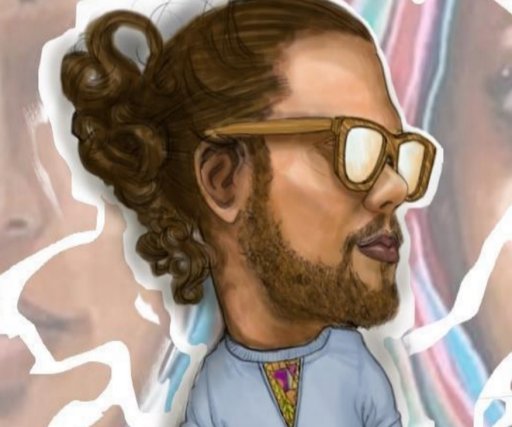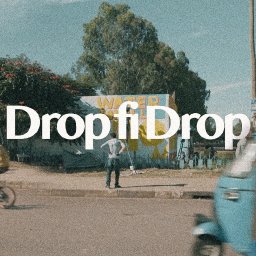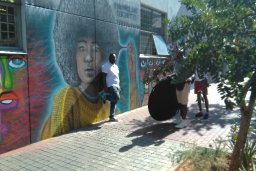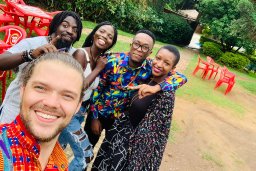Chin Chillah
Kigali, Rwanda

Monday January 17 2022, 9:33 AM
Despite days of preparations everything seems a bit improvised. But one thing is certain. Until 8:00 a.m. all takes for our joint music video must be recorded. After a long day of shooting and the first live performance of our song we are even more driven by our collective will and belief in a free Sudan.
The bright blue sky, the glistening morning sun, the flag of Sudan, the occupied railway track filmed from the barricaded street below. This last scene is to become the cover of our song as it represents the hope and pain of the project like no other.
In the past six months, I have been to Sudan three times to work on a sanitation project in Darfur. However, I am not only a wastewater engineer, but also a musician and activist. Already in the beginning of last December, I realised that this stay would not be an easy feat. On 19 December, protests erupted over the rising cost of living and the lack of prospects for the youth, who knew only one constant between the genocide in Darfur and the civil war in South Sudan: Omar Al Bashir. Within just two days, the protests grew into a mass movement throughout the entire country against the repressive long-term regime. In response to the call for self-determination, however, it responded with live ammunition on peaceful protest marches. During this time, I meet Mutassim and Wini.
Mutassim is a doctor, the profession that embodies this protest like no other. Not only because the disposable respiratory masks are seen everywhere as basic equipment against the tear gas, but also because the paramilitary thugs of the Rapid Support Forces (RSF) and the National Intelligence and Security Service (NISS) specifically target hospitals and doctors who tend to wounded demonstrators.
Wini is a wastewater engineer as well, we were introduced to each other at a work meeting as she worked on sanitation systems in camps of internally displaced persons in Darfur. She comes from a liberal academic and activist family.
It is April 6: the Sudan Professionals Association organised a protest march towards the headquarters of the ground forces and the Ministry of Defense, dubbed the “Millions March”. Despite a nationwide state of emergency hundreds of thousands predominantly young people answered the call and occupied the most strategic streets of the country’s military, in an action so courageous that it has no equal. On Al Bashir's orders, RSF militia opened fire on protesters.
Mutassim shows me videos of the shootout; Wini tells me that people who have not eye-witnessed these days at the Revolution Square are called out as cowards. However, both of them are glad that they have not been at the central place of the civil disobedience on this day. Finally, the military steps in, stops the murderous turpitude of the militias, ousts Al Bashir and places him under house arrest. These are the days in which I travel to the country of the two river Niles for the last time.
At first, I am very sceptical when Mutassim calls me and says that he was on his way to pick me up and drive with me to the Revolution Square. I have just been back in the country for an hour. At the end, I am glad that my curiosity has prevailed over my concerns, because the vibe and energy is overwhelming. A mix of strength and hope, despair, pain and exhaustion. The whole country seems to dance on the ruins of the fallen regime. On spontaneously constructed stages, tents and libraries people gather to sing, paint and debate about a future in freedom. That evening, I spontaneously find myself in the middle of a jam session singing songs of redemption with local musicians.
During this visit, a cooperation with Wini is already planned in advance. It so happens that one evening after work, we sit together with Mohammed and chat about the current situation and music and come up with the idea to produce a song about the revolution. His apartment is more like a refuge for freethinkers, in which the strict laws of the regime do not apply. As I tune into Nubian Reggae music the two recite protest slogans to be integrated into the lyrics. Hence, the phrases "Sabbina", "Selmiya" and "Medeniya"[1] are already central components of the song from the beginning, before we have even found a producer, other artists, let alone a studio.
The most important and reliable partner proves to be Nile, his real name is Moawia Khalid - a brilliant musician, composer and producer who operates a studio and a music school in the south of Khartoum. Mutassim introduced us. His wife and Nile are cousins. Within two weeks we get a total of 11 local and international musicians into the studio. Most impressively, none of the artists has to be convinced. Every single person I interact with during those days give everything for this revolution. The instrumental and vocal recordings are successively put together and Nile provides me with daily updates while I conduct a workshop in Darfur together with Wini.
Upon our return to Khartoum, we only have one more day to record footage for the video. Equipped with two filmmakers, headlights, the majority of participating musicians, Wini, other supporters and a zest for action, it is way past dawn of the next day, that we have all the footage we wanted including a live performance of the song with all present artists. It is a breath-taking experience to spend the whole night at the protest. The energy, love and support of all the people involved and engaged with our project is overwhelming. I am exhausted, but also extremely proud of what we have brought to life together in the previous weeks when I leave the country on 13 May.
However, our worst apprehensions shall come true. Most of the permanent sit-in protester are already drained from fasting, the heat, and the dusty air that caused many people to have respiratory ailments. At dawn of June 3rd, the violent crackdown of the sit-in protest plunges the country into chaos for days. The equipment of one of our filmmakers gets destroyed in the attack. The country is paralysed and in a state of shock and trauma.
In the end, we are only able to complete this project because Nile has travelled to Dubai with a hard drive in his bag to upload the footage.
We want to shed more light onto the continuously volatile situation in Sudan with a particular focus on the flourishing arts and music scene that arose during the days of the revolution. Because of the overwhelming feedback and well-wishes that we received, we have continued the works as arts collective dubbed “Voice of Sudan”. We already started planning a collective sampler including local and international artists. With the revenues we will establish a free space for artistic expression of ideas and thoughts. Nile’s already existing recording studio and music education centre will serve as our base. To bring this ambitious idea to life, we are in need for support and funds. Get in touch to learn more.
The song titled “System Must Fall” was released on June 29th, one day prior to the last major mass protests, and is available on various YouTube channels and popular streaming platforms.
[1] The three words mean ”like concrete” – a reference made to the enduring sit-in of protesters, “peaceful” and “civil” – that’s how the new Sudan should be like
Songwriter
Reggae
Damian Marley, Protoje, Chronixx, Kabaka Pyramid, Etana, Gentleman








